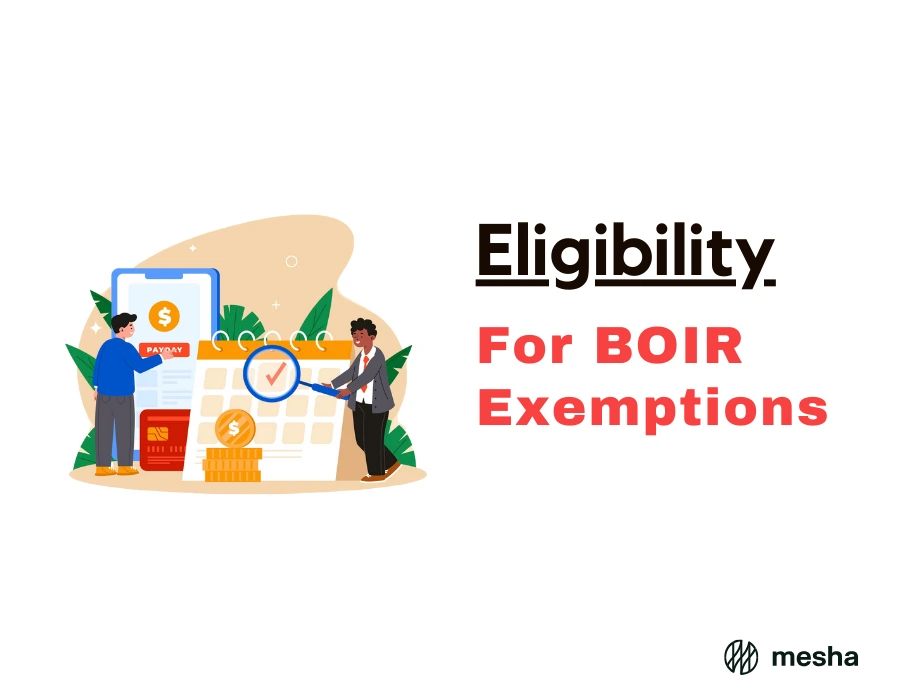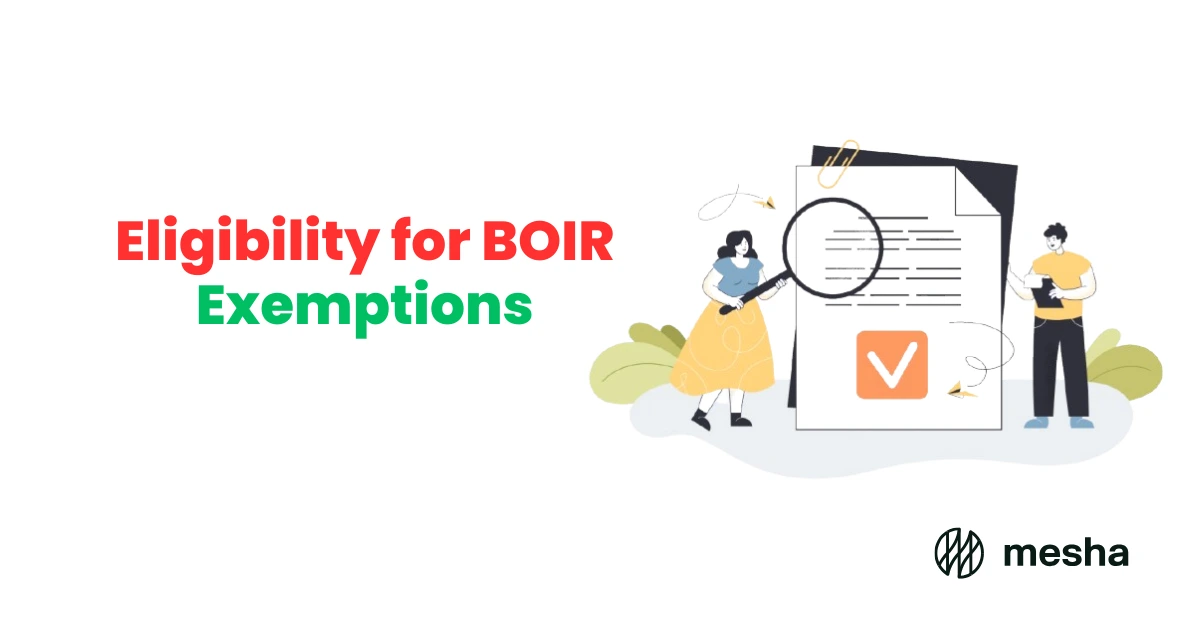BOIR exemptions under the Corporate Transparency Act are vital for businesses navigating financial reporting. Beneficial Ownership Information Reports (BOIR) are essential for transparency, but not every business needs to file them.
Table of Contents
Understanding BOIR Exemptions
Understanding these exemptions can simplify compliance and reduce the risk of penalties. There are 23 specific exemption categories, covering various entities like large operating companies, inactive entities, and financial institutions.
Why do these exemptions matter?
- Simplified Compliance: Avoid unnecessary paperwork.
- Reduced Risk: Minimize exposure to penalties.
- Operational Clarity: Understand what’s required for your business.
Knowing which category your business falls into can streamline your operations and align with financial reporting obligations.
Stay informed and ensure you’re leveraging the benefits of these exemptions effectively.
Criteria for BOIR Exemptions
To qualify for BOIR exemptions, businesses need to meet specific criteria. Understanding these categories helps in determining eligibility and compliance.
Key Criteria:
- Large Operating Companies: Must have over 20 full-time U.S. employees, a physical U.S. office, and report more than $5 million in revenue.
- Inactive Entities: Should not have engaged in business activities for the past year and maintain no assets or ownership changes.
- Registered Financial Entities: Includes businesses like banks and credit unions under federal regulation.
Why It Matters:
- Employee Count: Determines if a business is considered large enough for exemption.
- Revenue Thresholds: Helps assess financial capability and compliance requirements.
- Operational Status: Identifies if an entity is actively engaged in business or dormant.
Assessing these factors accurately ensures businesses can leverage exemptions and avoid unnecessary filings. Understanding where your business fits is crucial for aligning with BOIR regulations. For businesses looking to optimize cash flow and enhance financial health, exploring strategies to reduce Days Sales Outstanding can provide valuable insights into improving liquidity and overall performance.

Exempt Entities and Their Advantages
Certain entities can skip filing BOIR, easing their compliance load. Large operating companies, banks, credit unions, and others are among these exempt categories.
Large operating companies enjoy reduced paperwork. With over 20 full-time employees, a U.S. office, and more than $5 million in revenue, they meet the criteria for exemption.
Banks and credit unions benefit from their federal regulation. This exemption means they focus more on core operations without the additional reporting hassle.
Advantages of Exemptions:
- Reduced Reporting: Saves time and resources.
- Streamlined Compliance: Simplifies processes, ensuring smooth operations.
- Focus on Core Activities: Allows more attention on business growth and client service.
Entities fitting these categories can leverage these exemptions to enhance efficiency. Understanding where your business stands ensures you take full advantage of these opportunities.
Also Read: Beneficial Ownership Information (BOI) Filing Requirements
Impact of BOIR Exemptions on Businesses
BOIR exemptions can significantly influence business operations. They offer relief from extensive reporting requirements, allowing companies to allocate resources more efficiently. This relief translates to less administrative hassle, letting businesses focus on their core activities.
However, it’s essential to understand that exemptions come with their own set of responsibilities. Businesses must ensure they meet specific criteria to maintain their exempt status. Failure to comply can lead to penalties, such as daily fines and possible legal charges. This risk underscores the importance of staying informed about regulatory obligations.
Exemptions impact financial management by reducing the need for detailed reporting. This can lead to faster decision-making and more streamlined operations. Yet, it also requires businesses to be vigilant in maintaining the conditions for exemption to avoid unexpected liabilities.
For legal firms, leveraging platforms like mesha can enhance efficiency in managing these exemptions. With secure file sharing and AI-driven tools, mesha supports compliance while reducing administrative workload. Understanding the broader implications of BOIR exemptions is crucial for aligning business strategies with regulatory requirements.
Additionally, for businesses aiming to improve their invoicing processes, Mesha’s comprehensive solution for automating invoice follow-up can enhance productivity and focus on growth by centralizing client management and optimizing processes.
Ultimately, exemptions can offer significant advantages, but they demand careful management to ensure compliance and optimize operational benefits.
Special BOIR Reporting Rules
Entities with BOIR exemptions need to follow special reporting rules to maintain compliance. These guidelines ensure clarity and help avoid penalties. Here’s a look at some specific cases:
- Entities Owned by Exempt Entities: If your entity is owned by another exempt entity, you might qualify for exemptions. Ensure that ownership structures align with exemption criteria.
- Minor Child Reporting: Entities owned by minors are subject to unique reporting conditions. Legal guardians usually handle these obligations, ensuring compliance with BOIR requirements.
- Foreign Pooled Investment Vehicles: These entities have distinct rules. They’re generally exempt from certain filings, but it’s crucial to verify how U.S. regulations apply to your specific situation.
Understanding these nuances helps in navigating BOIR exemptions effectively. Each category comes with its own set of requirements, so staying informed is key.
For law firms, managing these intricacies with mesha can streamline processes. Our secure file sharing and AI-driven tools assist in maintaining compliance effortlessly, freeing your team to focus on client service. Discover how mesha’s accounts receivable services can enhance your financial management by reducing Days Sales Outstanding and improving cash flow cycles.
Ensure that your entity aligns with these rules to make the most of BOIR exemptions and avoid potential pitfalls.
Navigating BOIR Filing Deadlines
Stay informed about key deadlines for BOIR filings. Timely compliance is crucial for both existing and new businesses. Missing these deadlines can result in significant penalties, so understanding the timeline is essential.
Existing businesses usually have a set period to file their BOIR after the Corporate Transparency Act takes effect. New businesses must file within a specific timeframe from their formation date. Knowing these timelines helps in planning and avoiding last-minute scrambles.
What are the consequences of missing these deadlines?
- Daily Penalties: Civil penalties can amount to $500 per day for each day of non-compliance.
- Legal Risks: Potential criminal charges can further complicate matters.
- Reputation Impact: Non-compliance might harm your business reputation and client trust.
Avoiding these pitfalls requires vigilance. Regularly review your filing requirements and ensure that all necessary paperwork is completed on time. Using a reliable management platform can help keep track of deadlines and ensure compliance.
For law firms, efficient management of these tasks is vital. Leveraging mesha’s secure file sharing and AI-driven tools can simplify the process, helping you focus more on legal practice and client service. Stay proactive and ensure your business remains compliant with BOIR requirements by exploring strategies to ensure clients pay faster, which can help maintain healthy cash flow and reduce stress.
Key Takeaways on BOIR Exemptions
Understanding BOIR exemptions is crucial for businesses aiming to navigate regulatory waters smoothly. These exemptions simplify compliance, reduce risks, and provide operational clarity, helping companies focus on their core activities.
Key Points:
- Criteria Awareness: Knowing the specific criteria for BOIR exemptions, like employee count and revenue thresholds, helps businesses determine their eligibility and compliance needs.
- Exemption Benefits: Entities meeting exemption criteria benefit from reduced paperwork, streamlined processes, and increased focus on business growth.
- Special Reporting Rules: Even exempt entities must adhere to certain reporting rules to maintain their status and avoid penalties.
For law firms, managing these exemptions efficiently is vital. Our platform, mesha, provides secure file sharing and AI-driven tools that streamline compliance tasks, allowing legal professionals to concentrate on client service.
Staying informed about BOIR exemptions and their implications ensures businesses remain compliant and optimized for success. Embracing these insights can lead to enhanced efficiency and better resource allocation.
